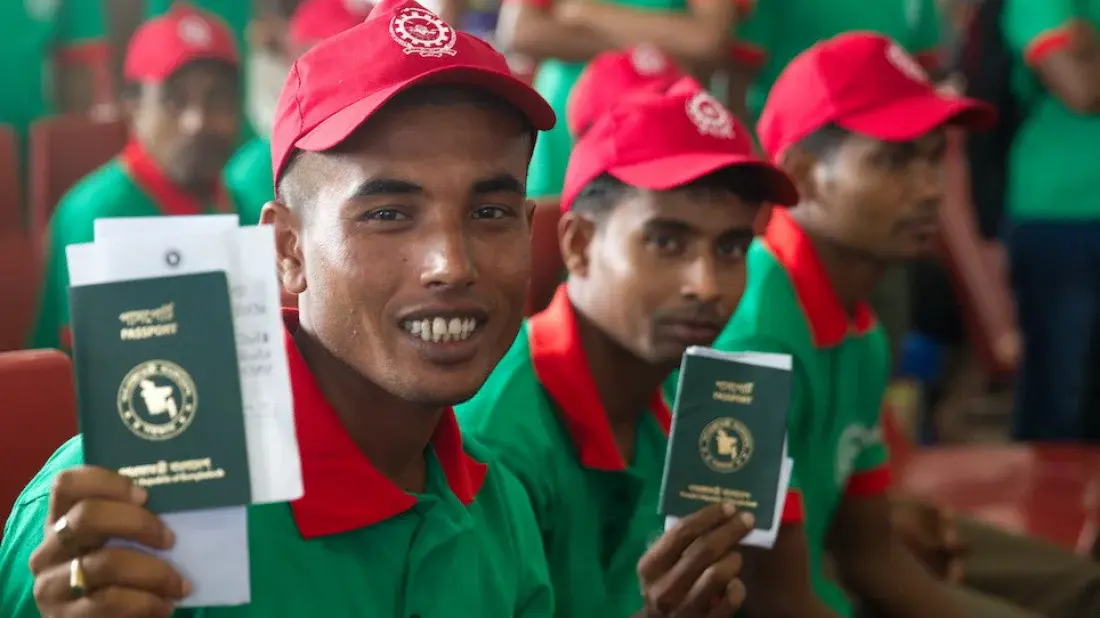According to the Bureau of Manpower, Employment and Training (BMET), Bangladesh sent a total of 97,862 workers abroad in January 2025.
Saudi Arabia remained the top destination, receiving 76,618 workers due to its extensive infrastructure projects ahead of the 2034 FIFA World Cup. Other key destinations included Qatar (6,880 workers), Singapore (4,847), Kuwait (2,878), and Oman (2,340).
However, the number of Bangladeshi workers heading to European countries was significantly lower. Germany received 11 workers, Italy 335, Hungary 118, the UK 74, Ireland 40, Portugal 458, Croatia 300, Cyprus 97, Bosnia-Herzegovina 28, and Greece 9.
With the European Union (EU) experiencing a decline in its working-age population, Bangladeshi diplomats and the Bangladesh Association of International Recruiting Agencies (BAIRA) emphasize the need for mid- and long-term strategies to send skilled workers to these markets.
Bangladeshi diplomats in Germany, Romania, Italy, Portugal, and Greece confirm that labor shortages are creating new opportunities. A Bangladeshi businessman in Portugal suggested that establishing language institutes in Bangladesh’s major cities could help workers integrate into the Portuguese labor market.
Similarly, diplomats in Germany stress the necessity of German language proficiency for Bangladeshi workers seeking employment there. A diplomat in Berlin noted that many Bangladeshi job seekers fail to meet language requirements, limiting their opportunities.
Germany, the largest European economy, is facing a shrinking workforce. A study by the Bertelsmann Foundation projects that Germany will need 288,000 skilled foreign workers annually to maintain its labor force. Without sufficient immigration, the workforce could shrink from 46.4 million in 2023 to 41.9 million by 2040 and as low as 35.1 million by 2060.
Susanne Schultz, a migration expert at Bertelsmann, warned that Germany must balance domestic workforce development with increased immigration. In response, Germany reformed its labor migration laws in 2023, with Interior Minister Nancy Faeser promising "the most modern immigration law in the world."
Strengthening Bangladesh-Greece Labour Relations
Former Bangladesh Ambassador to Greece, Ashud Ahmed, highlighted the significant role of the Bangladeshi community in strengthening bilateral relations. With approximately 35,000 Bangladeshis residing in Greece, a Memorandum of Understanding (MoU) between the two nations is facilitating the regularization of undocumented migrants.
Under this MoU, Greece is set to recruit 4,000 Bangladeshi workers annually in agriculture and hospitality. Additionally, Greece has announced plans to hire 20,000 Bangladeshi workers over the next two years as part of a pilot initiative for the hospitality sector.
Establishing Diplomatic Missions in Eastern Europe
A senior official from Bangladesh's Ministry of Foreign Affairs proposed that Bangladesh construct high-rise condominiums in Gulshan to accommodate Eastern European embassies. Many Eastern European countries, including Bulgaria, Croatia, the Czech Republic, Estonia, Latvia, Lithuania, Hungary, Poland, Romania, Slovakia, and Slovenia, currently lack diplomatic missions in Dhaka due to high operational costs.
An official from Rajdhani Unnayan Kartripakkha (RAJUK) noted that Bangladesh still owns land in Gulshan that could be allocated for foreign embassies. Currently, Germany and France share a building in Baridhara for their diplomatic missions, and other EU countries may follow suit if offered similar arrangements.
Challenges and Future Prospects for Bangladesh’s Manpower Export
Bangladesh’s manpower exports fell by 24% in 2024, with 997,008 workers sent abroad compared to 1,305,453 in 2023, according to BMET data. The decline was attributed to the global economic slowdown, Middle Eastern conflicts, and Malaysia and Oman suspending labor recruitment.
Saudi Arabia remained the largest destination, employing 615,487 Bangladeshis (61.73% of the total). Other major markets included Malaysia (93,631 workers), Qatar (73,959), the UAE (47,187), Singapore (56,210), Jordan (15,330), Kuwait (32,730), Italy (1,162), Japan (1,079), the UK (3,547), and Oman (358).
With Malaysia suspending labor imports since June 2024, a BAIRA leader stressed the need to explore new markets in 2025. Deputy High Commissioner of Bangladesh in Kuala Lumpur, Khorshed Khastagir, confirmed that the government is actively working to reopen the Malaysian market this year.
Bangladesh achieved a record manpower export of 1,305,453 workers in 2023, surpassing the previous high of 1,135,873 in 2022.
Expanding Skilled Manpower Exports
Bangladesh is set to send its first batch of trained nurses to Saudi Arabia in 2025, according to Bangladesh Overseas Employment and Services Ltd. (BOESL). Saudi Arabia, home to nearly 3 million Bangladeshi expatriates, has a growing demand for healthcare professionals.
To work in Saudi Arabia, nurses must pass the Saudi Prometric Exam. While Bangladesh produces many nursing graduates, many lack this certification. BOESL Executive Director Shawkat Ali reported that 150 nurses are undergoing training to meet Saudi requirements.
Former Saudi Ambassador to Bangladesh, Essa Yousef Essa Al Duhailan, emphasized Saudi Arabia's interest in recruiting skilled Bangladeshi professionals, particularly in healthcare and technical fields. He urged Bangladesh to train electricians, masons, carpenters, painters, and health technologists to meet labor demand in the Middle East.
Future Outlook
BMET Director Mamun Sarder expressed optimism about the overseas employment trend, predicting higher remittances in 2025. Deputy Director Mohammad Jahirul Alam Majumder highlighted that expatriate earnings have increased consistently over the past nine months, boosting remittance inflows.
To enhance workforce skills, the government has established multiple training centers nationwide, offering courses in shipbuilding engineering, refrigeration and air-conditioning, electrical maintenance, auto CAD 2D and 3D, welding, catering, and languages including Korean, Arabic, Cantonese, and Japanese.
With Saudi Arabia leading the global construction sector, valued at $1.5 trillion, demand for skilled Bangladeshi workers is expected to grow. The Kingdom accounts for 39% of construction projects in the Middle East and North Africa, making it a key destination for Bangladeshi laborers.
Shamim Ahmed Chowdhury Noman, former Secretary General of BAIRA, called for resolving issues such as high iqama fees in Saudi Arabia to stabilize the labor market.
Moving forward, Bangladesh must strengthen vocational training programs and language proficiency courses to access new labor markets, particularly in the EU and the Middle East.








.svg)

